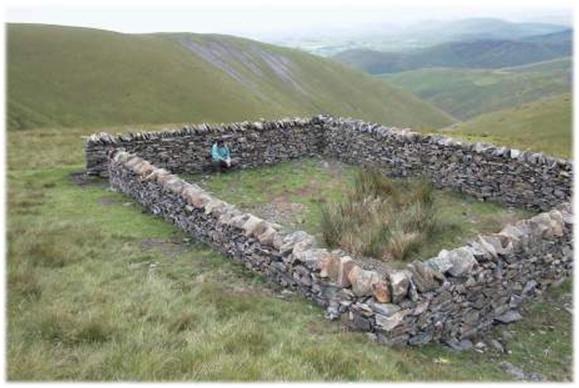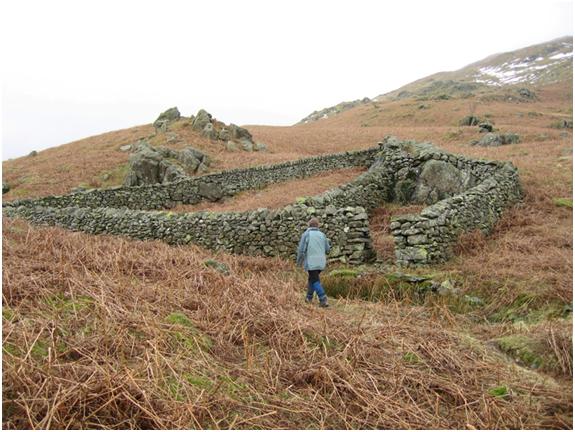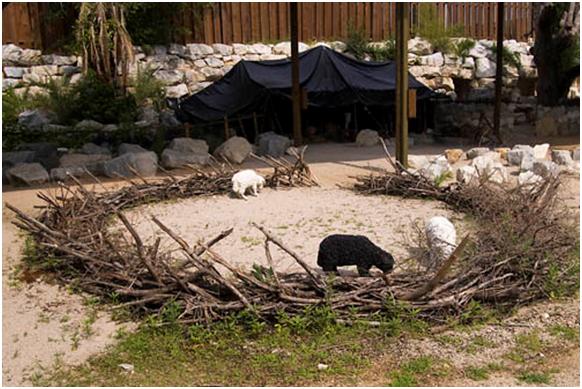The Pharisees corner Jesus on His thoughts about their spiritual condition. “Do you think we’re blind?” Jesus turns the table on them in His response. “No you are not blind. You hang onto your sight.” (John 9:40-41) It was their pride and the self-righteousness that kept them from seeing Jesus as the Messiah. In sin, the eyes of Adam and Eve were opened (Genesis 3:7) and innocence was lost. The Pharisees were in the same state. It was all about what they themselves brought to the table. I heard a great quote last night from Adrian Rogers, “Holiness is not the way to Christ, but Christ is the way to holiness.” Thus Jesus began the Sermon on the Mount, “Blessed are those who are spiritually bankrupt, for the kingdom of heaven is in their reach.” (Matthew 5:3). It’s when we realize that we are spiritually blind and bring nothing to the table that we can accept God’s gracious gift and find true life in Christ.
Jesus continues the discourse by presenting the Pharisees as bad shepherds of God’s people. He begins “Truly, truly.” (John 10:1) In the Greek, the word is “amen”. He begins, “Amen, amen.” We usually end our prayers with this word, not begin our sermons with it. When we say “Amen” we acknowledge our agreement, “That’s right, that’s truth.” Jesus alone uses this word to begin a sentence in the New Testament. I like the rendition, “I Who am Truth, tell you this truth . . .”
As He frequently does, Jesus uses an object lesson to illustrate truth. The object this time is a sheepfold. Perhaps there was one within viewing distance, but all would be familiar with a sheepfold in that culture and day. We are not so accustomed. The object one might use here in Arizona is a corral. Sheepfolds were enclosures where the sheep would spend the night in relative safety. Here’s some images . . .

http://www.edenconservation.com/images/finished.jpg

http://www.leaney.org/photos/2007/20070211d.jpg

http://ferrelljenkins.files.wordpress.com/2009/07/eac_sheepfold_dp7410t.jpg
They might be comprised of rocks, thickets, or even hewn into cave. In either case there was a single narrow door in which the shepherd would sleep, guarding his flock. But in towns, there were communal sheepfolds where a shepherd could drop off his flock whenever he returned home for a good night’s sleep. The shepherd would hire a gatekeeper who would position himself in the door and keep watch over the flock.
We sometimes drop our beloved rottweiler, Reba, off at Doggie Day Camp for a play day with other dogs in air conditioned comfort. In registering her, we had to provide the names of anyone else we would allow to pick up our dog in the case of an emergency. They won’t let just anyone pick up our dog. So it was the gatekeeper. The gatekeeper would only allow the shepherd to remove his sheep.
The shepherd would never sneak in over the back fence to get one of his sheep. Only a thief would do that. Jesus is saying to the Pharisees, I am the One whom the Gatekeeper recognizes. The Gatekeeper is My Father. You are thieves. You do not care for the flock, you abuse the sheep.” He goes on to contrast this by saying the sheep know the shepherd and follow him, but flee from the stranger, from those who do not care for them. (John 10:3-5) At Doggie Day Camp, Reba is sometimes in a glass-walled room where shoppers can watch the dogs at play, When we go to pick her up, we sometimes try to first watch her interact with the other dogs, but it normally only takes a few seconds before she spots us on the other side of the glass wall and excitedly turns her attention to us. She knows her dad and mom.
The Pharisees didn’t get the metaphor, so Jesus spells it out even further with the next I AM statement. “I am the door of the sheep.” (John 10:7-8) Some have equated this with the shepherd sleeping in the doorway. But notice He didn’t say “I am the door of the sheepfold.” He made it much more personal, much more relational. Nor did He say he was a door, but He was the THE door. He alone is THE access to the Father, to salvation, to peace with God, to eternal life, to the abundant life here and now.
Jesus warned in Matthew 7:13-14, that the majority would choose to NOT walk through His door. We want to be in control, even if that control is self-destructive. Perhaps we just don’t fully grasp the message and the promises. So what does one gain through THE Door? What is this abundant life? John 10:9 provides three details:
- You will be saved (The Greek term σώζω (sṓzō) means to be delivered, or preserved safe from danger, but also to be made whole – you will enter into a restored relationship with the Creator and saved from His wrath);
- You “will go in and out”. This phrase is used of several things in the Hebrew Scriptures: In Psalm 121:7-8 it speaks of security and protection. Those in Christ will be safe from the thieves and robbers. In Jeremiah 37:4 the phrase is used of freedom. We are told the Truth shall make us free in John 8. We are free from the slavery of sin. The phrase of “go out or come in” in I Kings 3:7 speaks to having spiritual maturity. When we enter into a relationship with Christ, we receive the Holy Spirit who guides us into truth, discernment, and spiritual maturity. Finally, Isaiah 55:11-12 speaks of going out in joy and being led forth with peace. Who doesn’t want security, freedom, spiritual maturity, and joy and peace?
- You will find pasture. Psalm 23:2 and Psalm 100:3 emphasize that the Shepherd makes us to lie down in green pastures . . . and they are His pastures which sustain spiritual health and growth.
Comments